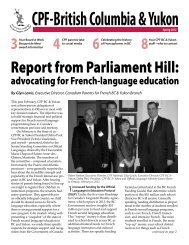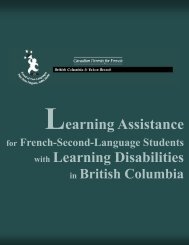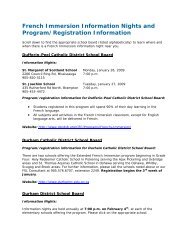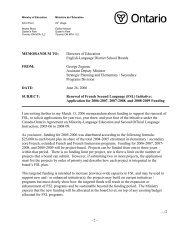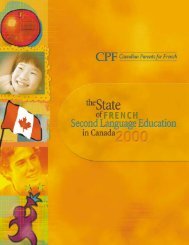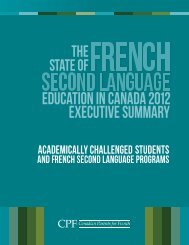Northwest Territories - Canadian Parents for French
Northwest Territories - Canadian Parents for French
Northwest Territories - Canadian Parents for French
You also want an ePaper? Increase the reach of your titles
YUMPU automatically turns print PDFs into web optimized ePapers that Google loves.
<strong>Canadian</strong> <strong>Parents</strong> <strong>for</strong> <strong>French</strong><br />
Provincial and National <strong>French</strong><br />
Second-Language Education<br />
Stakeholder Consultations<br />
<strong>Northwest</strong> <strong>Territories</strong> Consultation<br />
Yellowknife, NWT<br />
March 23, 2004
Table of Contents<br />
Introduction......................................................................................................................... 1<br />
Education ............................................................................................................................ 2<br />
Question 1: Students and learning .................................................................................. 2<br />
Question 2: Teachers and instruction.............................................................................. 3<br />
Question 3: Public opinion and community context....................................................... 4<br />
Question 4: Institutional support and accessibility ......................................................... 6<br />
Business .............................................................................................................................. 7<br />
Question 5 ....................................................................................................................... 7<br />
Arts, Culture, and Sports..................................................................................................... 8<br />
Question 6 ....................................................................................................................... 8<br />
Conclusions/Closing ........................................................................................................... 9
CPF Provincial and National <strong>French</strong> Second-Language Education Stakeholder Consultations<br />
Yellowknife, NWT • March 23, 2004 • Page 1<br />
Introduction<br />
Randy Patrick of <strong>Canadian</strong> <strong>Parents</strong> <strong>for</strong> <strong>French</strong> (CPF) welcomed participants and thanked them<br />
<strong>for</strong> attending. He explained that the reason <strong>for</strong> the NWT’s involvement in the consultations was<br />
that the territory would soon become a branch of CPF; until now, the NWT had been part of the<br />
Alberta branch. The NWT-CPF wants to lead and contribute to the development of <strong>French</strong><br />
language education in the NWT. Branch status also provides NWT-CPF with funding.<br />
Patrick introduced the facilitator, Jean-Marie Mariez.<br />
Mariez also welcomed participants and thanked them <strong>for</strong> attending the consultations, especially<br />
on such short notice. He asked the stakeholders present to share in<strong>for</strong>mation and ideas from this<br />
evening with those who were unable to attend.<br />
Mary Vane, Executive Director of CPF, noted that these consultations were a first step—further<br />
discussion and collaboration on strategy would be necessary in the future. She also noted the<br />
recommendations should include the identification of funding required <strong>for</strong> implementation.<br />
Mariez provided some background in<strong>for</strong>mation. In the 1970s and 1980s, many people were<br />
interested in learning a second language but in 2003, the federal Action Plan <strong>for</strong> Official<br />
Languages responded to the fact that, despite public support <strong>for</strong> linguistic duality and second<br />
official language education, the rapid growth of <strong>French</strong> immersion in the 1970s and 1980s had<br />
not continued through the 1990s.<br />
The Plan sets an ambitious objective of doubling the number of high school graduates who are<br />
functionally bilingual by the year 2013. As there are now 20 to 25 students in the NWT finishing<br />
their education in immersion, the target by 2013 would be to have 40 to 50 students. The plan<br />
also identifies strategies to achieve this goal and allocates additional monies <strong>for</strong> <strong>French</strong> secondlanguage<br />
education. In March 2004, the Office of the Commissioner of Official Languages, in<br />
partnership with the Department of <strong>Canadian</strong> Heritage, PCO Intergovernmental Affairs, and<br />
<strong>Canadian</strong> <strong>Parents</strong> <strong>for</strong> <strong>French</strong>, organized a symposium entitled Vision and Challenges <strong>for</strong> the 21 st<br />
Century. Stakeholders from various sectors of <strong>Canadian</strong> society discussed issues and proposed<br />
strategies that would help to achieve the Action Plan’s goal <strong>for</strong> 2013.<br />
Referring to the “<strong>Canadian</strong> <strong>Parents</strong> <strong>for</strong> <strong>French</strong>, Provincial and National <strong>French</strong> Second-Language<br />
Education Stakeholder Consultations” handout, Mariez noted that this evening was an<br />
opportunity <strong>for</strong> NWT <strong>French</strong> second-language education stakeholders to respond to<br />
recommendation and strategies articulated at the Vision and Challenges symposium with other<br />
provinces and territories. CPF is sponsoring the consultation with funding from PCO<br />
Intergovernmental Affairs.<br />
Mariez explained the process <strong>for</strong> the evening. Stakeholders would be divided into two groups to<br />
discuss two questions on the theme of “Education.” After the groups completed their<br />
deliberations, all stakeholders would meet and review the outcomes. Upon completion of<br />
“Education,” the themes “Business” and “Arts, Culture, and Sports” would be assigned, one to
CPF Provincial and National <strong>French</strong> Second-Language Education Stakeholder Consultations<br />
Yellowknife, NWT • March 23, 2004 • Page 2<br />
each group. After completing the second discussion in one of two groups, stakeholders would<br />
meet to review outcomes and wrap up the consultations.<br />
A participant asked if he was to speak <strong>for</strong> his particular community or <strong>for</strong> the benefit of the NWT<br />
It was noted that it was important to represent the realities of the NWT, including one’s<br />
particular community and school reality.<br />
Education<br />
Question 1: Students and learning<br />
What are the first steps to be taken in marketing bilingual education to students at all<br />
levels—from elementary to high school entry, from high school graduation to postsecondary<br />
education and life-long learning—and making it a genuine experience to learn a<br />
second language? How can resources and support from outside the classroom be mobilized<br />
to enrich FSL instruction and capture the magic of bilingual education?<br />
Recommendations<br />
• Promote FSL education to parents. Hold in<strong>for</strong>mation sessions<br />
• Provide adequate resources <strong>for</strong> classroom supports.<br />
• Provide extra support <strong>for</strong> small schools and communities.<br />
• Use mentors.<br />
• Provide money <strong>for</strong> bussing so that more students can participate in FSL education.<br />
Discussion<br />
How can resources and support from outside the classroom be mobilized to enrich FSL<br />
instruction and capture the magic of bilingual education?<br />
Participants in Group 1 described how marketing must include promotion to parents. Community<br />
learning is a good thing at all levels. Parental sessions should be held <strong>for</strong> core <strong>French</strong> programs<br />
as well as <strong>for</strong> <strong>French</strong> immersion programs.<br />
Support <strong>for</strong> classroom activities must include appropriate resources <strong>for</strong> a variety of students, as<br />
there is great disparity in levels of knowledge and skill. These materials are costly to develop and<br />
will require funding to complete.<br />
Support is particularly necessary <strong>for</strong> teachers in small communities. The group recommended<br />
funding a core <strong>French</strong> support specialist who would travel throughout a region supporting <strong>French</strong><br />
teachers.
CPF Provincial and National <strong>French</strong> Second-Language Education Stakeholder Consultations<br />
Yellowknife, NWT • March 23, 2004 • Page 3<br />
One means to support <strong>French</strong> students is through mentorship, bringing more <strong>French</strong>-speaking<br />
people into the school including <strong>French</strong>-speaking business people in the community. With about<br />
twenty <strong>French</strong>-based businesses in the NWT, there may be some way to set up work experience<br />
opportunities, although it was unclear how this would be done. A participant mentioned that<br />
NWT students cannot go to the post office and speak <strong>French</strong>.<br />
Notwithstanding the objective to double the number of bilingual high school graduates, it is<br />
important to focus on teaching <strong>French</strong> be<strong>for</strong>e or early in a child’s school career. It is accepted<br />
that students learn a second language best when they are very young.<br />
Participants identified a number of challenges. Employees of NWT businesses do not generally<br />
need <strong>French</strong> language in the territory and the public sector is less likely to need <strong>French</strong> than it is<br />
in a province such as New Brunswick.<br />
In order to encourage more people to go into <strong>French</strong> immersion, CPF could provide money <strong>for</strong><br />
bussing when students are required to travel out of their school’s catchment area.<br />
Question 2: Teachers and instruction<br />
What are the prospects <strong>for</strong> attracting and training the next generation of competent,<br />
enthusiastic FSL instructors, and <strong>for</strong> ensuring that they have the resources and support<br />
that they need to succeed?<br />
Recommendations<br />
• Provide adequate support to teachers in order to prevent burnout.<br />
• Respect First Nations and Inuit language instruction as well as FSL. It should not be an<br />
either/or choice.<br />
• Explore the possibility of offering instruction in three languages: English, <strong>French</strong>, and a<br />
Native language.<br />
• Make <strong>French</strong> language instruction fun.<br />
Discussion<br />
Participants discussing the second question noted that if more <strong>French</strong> teachers did not become<br />
available, increasing the number of <strong>French</strong> students could lead to very crowded classes.<br />
Teachers are asked to do more than they are able to. The average retention of a core <strong>French</strong><br />
teacher is seven or seven and one-half years. In order <strong>for</strong> this to improve, teachers need more<br />
support. Core <strong>French</strong> is very hard to teach—Grades 6 to 9 are most difficult. Students’ and<br />
parents’ attitudes are not generally supportive. Thus, it is important to promote core <strong>French</strong> and<br />
find ways to make it fun. In addition, educators in the NWT have to be respectful of First Nation<br />
and Inuit languages, even though it should not be an either/or situation.
CPF Provincial and National <strong>French</strong> Second-Language Education Stakeholder Consultations<br />
Yellowknife, NWT • March 23, 2004 • Page 4<br />
One participant suggested that there could be <strong>French</strong>-language activities outside of the school,<br />
but another countered that children are already busy with extra-curricular activities. Another<br />
participant suggested bringing the community to the school. The many <strong>French</strong>-speaking business<br />
owners in Yellowknife might be persuaded to get involved in school activities or receive students<br />
in their businesses. This would be important in relation to career development as well.<br />
As well, there will always be an issue with recruiting <strong>French</strong> teachers in rural (small, remote)<br />
communities. Because of the interest by First Nations and Inuit people in Aboriginal languages,<br />
the viability of <strong>French</strong>-language classes can be questionable. <strong>Parents</strong> and students in Calgary<br />
(among other centres) are considering education in three languages, something that should be<br />
promoted as an option <strong>for</strong> Northerners.<br />
Teachers are being asked to do things they are not trained to do. The high attrition rate <strong>for</strong><br />
<strong>French</strong> teachers leads to high student attrition from <strong>French</strong> immersion programs. Good teachers<br />
encourage kids to stay in <strong>French</strong>. Teaching positions are demanding because of difficulties of<br />
scheduling, high level of preparation, wide range of student skill levels, and lack of support.<br />
It is important to promote core <strong>French</strong> and find ways to make it fun.<br />
One participant asked if <strong>French</strong> immersion parents were supportive. The response was that they<br />
were not as supportive as they used to be when <strong>French</strong> immersion was first introduced. The<br />
elitism is gone from <strong>French</strong> immersion.<br />
Question 3: Public opinion and community context<br />
What are the dimensions of a community-based campaign to promote FSL instruction and<br />
support Canada’s Vision <strong>for</strong> 2013 objectives? What are the first steps, and who should be<br />
involved?<br />
Recommendations<br />
• Create opportunities <strong>for</strong> bilingual community members to interact.<br />
• Establish a national data centre to consolidate and centralize available Web in<strong>for</strong>mation,<br />
complete with a search engine <strong>for</strong> teachers.<br />
• Recruit a prominent person to promote FSL education.<br />
• Support CPF.<br />
• Provide funds <strong>for</strong> <strong>French</strong> language cultural tours.<br />
• Use posters, TV advertisements, radio advertisements, newspapers, and magazines to<br />
promote FSL education.<br />
• Provide funding <strong>for</strong> cultural exchanges.<br />
• Provide support <strong>for</strong> parents of FSL students, so they can be active participants in their<br />
children’s education.
CPF Provincial and National <strong>French</strong> Second-Language Education Stakeholder Consultations<br />
Yellowknife, NWT • March 23, 2004 • Page 5<br />
Discussion<br />
Participants recommended that communities create opportunities <strong>for</strong> bilingual members to<br />
connect. Communities are not supporting <strong>French</strong>.<br />
A national data centre is an excellent idea to consolidate and centralize all available Web<br />
in<strong>for</strong>mation. A search engine would allow <strong>for</strong> access to any subject. All other <strong>French</strong> language<br />
teaching organizations should be involved. There should be a very practical section <strong>for</strong> teachers<br />
including checklists, teacher strategies, and methods of promoting <strong>French</strong> language as well as<br />
in<strong>for</strong>mation <strong>for</strong> school boards, etc. Practical in<strong>for</strong>mation will be used. It should include both<br />
Core and <strong>French</strong> immersion curriculum materials.<br />
Recruiting a prominent person to promote <strong>French</strong> language education would be a bonus <strong>for</strong><br />
public opinion. One participant thought this would be difficult but another noted that<br />
Yellowknife has various proficient francophones, including artists, chefs, and others. Other<br />
figures who could promote the <strong>French</strong> language are NWT <strong>French</strong> immersion graduates whose<br />
success is related to their bilingualism, <strong>for</strong> example, students returning as <strong>French</strong> teachers.<br />
More organizations need to be encouraged to support CPF. The list should include the <strong>Canadian</strong><br />
Teachers’ Federation.<br />
Authors, writers, and dramatists—almost all English speaking—frequently visit NWT<br />
communities. Money <strong>for</strong> <strong>French</strong>-language cultural tours would be a big help.<br />
Identifying a national champion, such as the Minister of Education in Newfoundland and<br />
Labrador, is a good idea.<br />
It is not good to rely too much on use of the Internet because youth are too busy to spend time<br />
searching <strong>for</strong> <strong>French</strong> language, unless they are already interested. By using a lot of posters, TV<br />
advertisements, radio advertisements, newspaper and magazines, a broad base of people would<br />
be reached. Posters should include an Internet address that would provide more in<strong>for</strong>mation.<br />
Recognition opportunities should continue, including scholarships and prizes.<br />
Participants had a number of suggestions to promote <strong>French</strong>-language education, beginning with<br />
the provision of work opportunities in <strong>French</strong>-speaking businesses. One participant countered<br />
that this would be difficult, as <strong>French</strong> is not a functional language in the workplace in the NWT<br />
Other suggestions were to promote immersion opportunities <strong>for</strong> a semester, and/or three-month<br />
exchanges as well as summer programs <strong>for</strong> all students.<br />
Some challenges specific to the NWT were raised. First Nations and Inuit people, who comprise<br />
about half of the population, feel strongly about the preservation and study of their own<br />
languages. As well, travel is very expensive. Air travel within the NWT or to Québec is as costly<br />
as Ontario–France travel. This cost needs to be figured into funding so that students are not<br />
required to do as much fundraising.
CPF Provincial and National <strong>French</strong> Second-Language Education Stakeholder Consultations<br />
Yellowknife, NWT • March 23, 2004 • Page 6<br />
Language programs <strong>for</strong> parents were suggested as a way to increase the number of parents who<br />
want their children to learn <strong>French</strong>.<br />
Some parents are concerned that they will not be able to help their children with <strong>French</strong>. Because<br />
potential <strong>French</strong> immersion parents are primarily English speaking, they often need reassurance<br />
about their children’s competency in English and worry that the addition of <strong>French</strong> will be a<br />
drain on other areas. Educators need to have good responses to this. Another participant<br />
identified available studies and in<strong>for</strong>mation including “The Handbook <strong>for</strong> Administrators in<br />
<strong>French</strong> Language.”<br />
Question 4: Institutional support and accessibility<br />
What major program and policy changes would enhance FSL instruction across Canada?<br />
What are the first, most practical steps that can be taken to build a more effective, more<br />
accessible system, and who should be involved?<br />
Recommendations<br />
• Offer professional development opportunities <strong>for</strong> teachers.<br />
• Test oral proficiency when teachers are hired.<br />
Discussion<br />
Participants first noted that competency is an important issue. An NWT school board was cited<br />
as an example—it rejected applicants because of level of language skill and yet these same<br />
applicants found jobs in other <strong>Canadian</strong> schools. There is a demand <strong>for</strong> <strong>French</strong> teachers. The<br />
solution to competency issues is to offer opportunities <strong>for</strong> teachers to improve linguistic skills<br />
through summer programs.<br />
The group did not support the implementation of competency tests. One participant noted that<br />
teacher testing is difficult to agree with. It is a territorial/provincial matter. The <strong>Northwest</strong><br />
<strong>Territories</strong> Teachers Association does not agree with testing. A teacher’s university degree is<br />
proof of his or her competency.<br />
One participant noted that oral testing could be completed when the teacher is interviewed and<br />
another participant said his school had <strong>French</strong>-speaking people attend the interview <strong>for</strong> that<br />
purpose.
CPF Provincial and National <strong>French</strong> Second-Language Education Stakeholder Consultations<br />
Yellowknife, NWT • March 23, 2004 • Page 7<br />
Business<br />
Question 5<br />
Is there scope <strong>for</strong> ongoing collaboration between the business and education sectors to<br />
increase the proportion of high school graduates with a working knowledge of both official<br />
languages? If so, based on the initial list of strategies developed at the National Symposium,<br />
what are the most promising opportunities <strong>for</strong> early action?<br />
Recommendations<br />
• Report on <strong>French</strong> news from all parts of Canada—just not from Quebec.<br />
• Ensure that Heritage Canada works closely with businesses to promote bilingualism.<br />
• Explore the possibility of having CPF partner with national and territorial Chambers of<br />
Commerce to promote bilingualism.<br />
Discussion<br />
Participants noted that this question was difficult to comment on. They were not sure if the<br />
<strong>Canadian</strong> Unity Council could provide travel money to students.<br />
The group recommended that <strong>French</strong> news from all parts of Canada be reported, as “it isn’t just<br />
about Quebec.” One participant noted that Channel 20 allows free time <strong>for</strong> programming and<br />
another participant identified the need <strong>for</strong> more mainstream coverage.<br />
There were questions about CPF’s liaison with <strong>French</strong> businesses and a suggestion that <strong>Canadian</strong><br />
Heritage work more closely with businesses. The federal government promotes and publicizes<br />
bilingualism; the group stated that it would like the business community to do the same with<br />
federal government support.<br />
Is CPF making a connection with business? Territorial CPF could partner with the Territorial<br />
Chamber of Commerce and the national CPF could partner with the National Chamber of<br />
Commerce. Students must understand that businesses want bilingual employees—both<br />
businesses and Heritage Canada should promote business and language needs. In addition, it is<br />
important to understand a culture as well as know its language.<br />
A participant observed that not all students will stay in Canada, so the need <strong>for</strong> multi language<br />
skills is great. Students need to “think globally.”<br />
One participant noted that newspapers should be provided more in<strong>for</strong>mation on <strong>French</strong><br />
programming in schools but other participants pointed out schools were begging <strong>for</strong> coverage.
CPF Provincial and National <strong>French</strong> Second-Language Education Stakeholder Consultations<br />
Yellowknife, NWT • March 23, 2004 • Page 8<br />
Another participant questioned what the term “bilingual work program” meant. Is the person<br />
required to be completely bilingual? “Functional bilingual” programs should be training in<br />
<strong>French</strong>, learning as-you-go.<br />
Arts, Culture, and Sports<br />
Question 6<br />
Is there scope <strong>for</strong> ongoing collaboration between the arts, culture, and sport sector and the<br />
FSL education community to increase the proportion of high school graduates with a<br />
working knowledge of both official languages? If so, based on the initial list of strategies<br />
developed at the National Symposium, what are the most promising opportunities <strong>for</strong> early<br />
action?<br />
Recommendations<br />
• Provide more funding opportunities in arts and language projects, and promote them to<br />
parents. (Some projects may already exist.)<br />
• Expand Jeu de la Francophonie to include more events and activities. A more extensive<br />
training program would help to increase participation.<br />
• Prepare a booklet or kit <strong>for</strong> parents on how to promote the use of <strong>French</strong> at home. This could<br />
include <strong>French</strong> music and cooking, advise on how to use <strong>French</strong> television programming as a<br />
learning tool, how to motivate kids to watch <strong>French</strong> programs, and questions that parents<br />
could ask their children.<br />
• Promote <strong>French</strong> television and radio programming. A great variety of it is available in the<br />
NWT<br />
• Provide money <strong>for</strong> sporting figures, and drama and arts personnel to come in and teach their<br />
skills, sport, or their craft in <strong>French</strong>. For instance, in Yellowknife the Speed Skating<br />
Association brings in a <strong>French</strong>-speaking coach every year <strong>for</strong> its summer camp. Almost all of<br />
the participating speed skaters are in <strong>French</strong> immersion. This gives students an opportunity to<br />
use the language outside school and outside the school season.<br />
• Promote and deliver community-based evening courses on various subjects or hobbies taught<br />
in <strong>French</strong>.<br />
Discussion<br />
Participants suggested that nationally, CFP could help with access to broadcasting programming<br />
and with cultural exchanges. Locally, CFP could have a huge impact by funding pottery, crafts,<br />
and drama classes in <strong>French</strong>.
CPF Provincial and National <strong>French</strong> Second-Language Education Stakeholder Consultations<br />
Yellowknife, NWT • March 23, 2004 • Page 9<br />
Conclusions/Closing<br />
Mariez drew the meeting to a close, thanking participants once again. He expressed hope that<br />
CFP would be pleased with the results, particularly given the short time frame.<br />
Mary Vane said it was CPF’s hope that there will be funding down the road that would enable<br />
the NWT-CPF to flesh out its plans. She noted that this is a start on a journey to increasing<br />
<strong>French</strong> bilingualism in the NWT.<br />
Participants had some additional comments:<br />
• Ensure that the required resources are in place in order to keep children in <strong>French</strong><br />
immersion—resources to strengthen students’ skills and to support their confidence from the<br />
beginning of their schooling. This requires a global vision from Grade 1 to Grade 12,<br />
supported by an action plan from CPF.<br />
• Produce resources specifically <strong>for</strong> <strong>French</strong> immersion students and do not rely solely on<br />
resources developed <strong>for</strong> francophone students.<br />
• Use successful students who have graduated from immersion programs to promote <strong>French</strong><br />
immersion.<br />
Patrick concluded the evening and thanked participants <strong>for</strong> giving up their evening <strong>for</strong> the good<br />
of youth and children.



